James McKillop, husband and father of four, was awarded the MBE by the Queen of England and received an honorary doctorate degree.* Before being bestowed with these two honors, he was forgetting how to do his job, which he describes as “simple clerical work.” He was also forgetting the names of people he had known for many years.
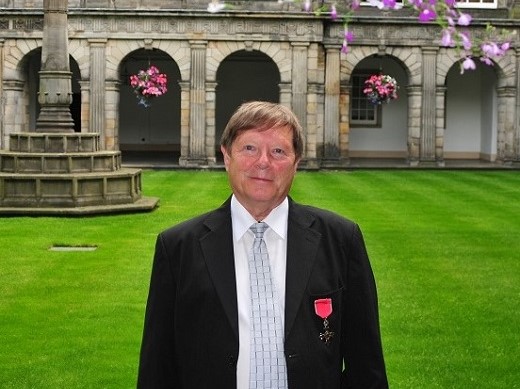
MID Diagnosis
James says, during an interview via Google Hangouts earlier this month, “I went in for a brain scan and learned I had been getting TIAs. In November of 1999 [age 59], I was diagnosed with multi-infarct dementia.” [MID is a type of vascular dementia caused by mini-strokes in multiple areas of the brain.]
Since then, James started the Scottish Dementia Working Group for people with dementia. He served as the organization’s chair for six years, took a break, and then returned as vice chair for a year to help the new chair. He remains a member.
What does your care partner do that’s good and what areas can she improve?
While this question may put James’ wife and carer on the spot, it’s asked with the hope that his answers will help caregivers learn another’s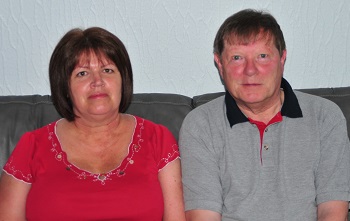 experience. James shared three comments – what he likes, what he wishes were better, and his take on the caregiver’s perspective.
experience. James shared three comments – what he likes, what he wishes were better, and his take on the caregiver’s perspective.
- “Obviously, Maureen [wife/carer] does a good job looking after my health with the tablets [medications], looking out for my hygiene, and taking me out to places for a wee coffee.”
- “At times, I think she forgets I have dementia. I get annoyed… I don’t look as if I have dementia, which begs the question: What does a PWD [person with dementia] look like? People forget that while I am able to cope with many things, deep down I’ve got this dementia that stops me from doing things properly.”
- “There’s a lot of give and take. Advice to carers: You can get frustrated hearing the same thing over and over again. You need to take care of yourself. You need time to recharge your batteries.”
How is it living with dementia from your point of view, James?
“At the time of my diagnosis, it was a death sentence. People were given only a couple of years to live. There was also the stigma of being diagnosed with dementia.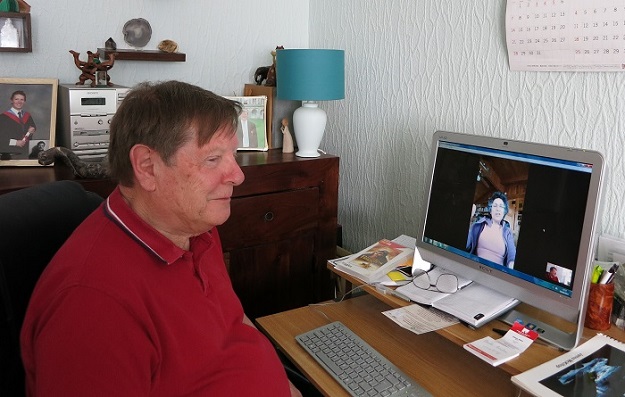 Up until the [new millennium], people with dementia were regarded as non-citizens. People would pat me on the head and ask, ‘How are you?’” [Picture a 59-year old man being treated like a child.] “’How can you talk?’ people would ask. ‘I learned as a boy,’ I’d reply.”
Up until the [new millennium], people with dementia were regarded as non-citizens. People would pat me on the head and ask, ‘How are you?’” [Picture a 59-year old man being treated like a child.] “’How can you talk?’ people would ask. ‘I learned as a boy,’ I’d reply.”
“Since then we’ve been trying to raise people’s awareness and change their perceptions that we are people living with an illness. Give us space. Encourage us to live to our potential. A lot of people can do things they never thought possible. They can deliver presentations… unheard of 20 years ago.”
“A couple years ago, I was at a conference in Europe. People were designated to help people with dementia. They wore uniforms. I had to go to the toilet, so this lady took me by the hand, lead me to the Gents’ room. She opened the door and lead me inside to a urinal. I feared she was going to unzip me. She let go of my hand and moved away. She stood at the door, watching.”
Remarkably, James reflects with understanding regarding this awkward, yet amusing incident. “She was a kindly, helpful person with absolutely no idea of what dementia is. She could have taken me to the door and I would have managed. I just didn’t know where the toilet was. The next day, I knew exactly where it was!”
We caregivers will do well to ask questions. In this instance, “How may I help you, James?” “Would you like me to walk with you?” “Shall I wait for you, here?” MID is unpredictable as a mini-stroke may target an area of the brain, resulting in a dramatic behavior change or loss of memory. We can’t assume what a person needs or wants. People with dementia deserve to be treated with understanding, compassion, and dignity.
Recently, you attended the ADI Conference in Kyoto, Japan. What was your experience?
James serves as a member of the board of directors for Dementia Alliance International (DAI), an organization founded and operated by and serving people with dementia, which participated in the annual conference of the Alzheimer’s Disease International (ADI). 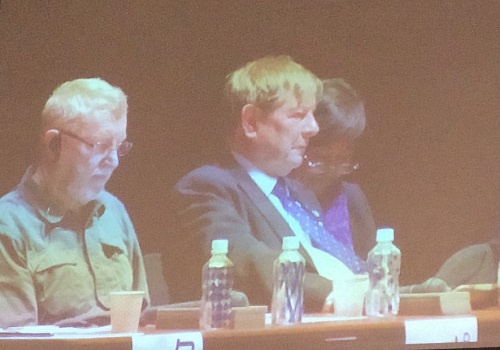
“I flew from Glasgow to Dubai and then to Osaka. I didn’t sleep a wink.” When asked if his wife, Maureen joined him, James chuckles, “My wife would not let me out of her sight!”
“The conference was an overall good experience.”
James was invited to present on an Alzheimer’s panel in Osaka – an event organized by NHK – Japan’s broadcasting center.
“There were lots of high-level sessions to choose from. One highlight was a session on dementia prevention – using something they haven’t tried before.” James hesitates, when asked for more information. “It was a wee bit technical… something to do with markers in your body… they can get rid of these markers. I just hope a prevention comes along, so my children don’t develop it or Maureen.”
James, when was your most recent TIA?
“A couple weeks ago, my wife was walking ahead of me, when I lost my balance and fell backward hitting the back of my head on the tarmac. I had on a backpack, which saved me from worse damage, such as suffering a concussion. Fortunately, she was there to help me.”
What is your experience living with MID, today?
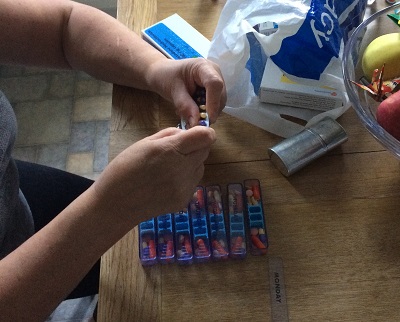 I live a normal life. My wife helps me in areas where I need help. I take 10 tablets a day and she arranges my medicine. She drives me about as I haven’t had my license in 15 years. She takes care of my hygiene as I won’t change my clothes, unless she sets them out for me.
I live a normal life. My wife helps me in areas where I need help. I take 10 tablets a day and she arranges my medicine. She drives me about as I haven’t had my license in 15 years. She takes care of my hygiene as I won’t change my clothes, unless she sets them out for me.
I live quite a happy life.
* At the end of our interview and after James reviewed the content to ensure its accuracy, he added two notable details.
- Honorary Doctorate from the University of Strathclyde in 2013
Since 2001, he’s been serving as a volunteer teacher for social work students.
- Queen Elizabeth awarded James McKillop an MBE or Member of the Most Excellent Order of the British Empire in 2011 for his dementia work and program initiatives.
WOW! Only a humble guy would add these two details as a footnote.
Thank you, Mick Carmody for referring The Caregiver’s Voice to James McKillop.
Thank you, Ross McKillop, for helping your dad set up Google Hangouts for our interview.








